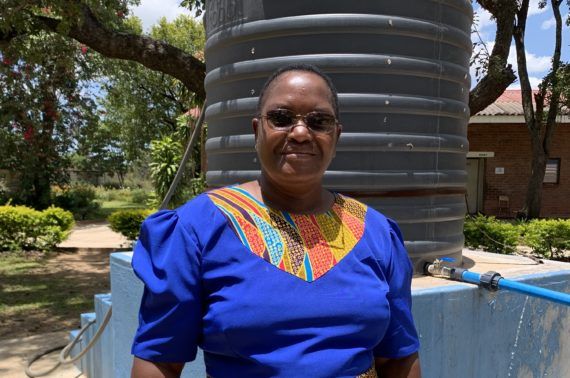 Stories
Stories
February 17, 2022 • 2 min read
Poor local infrastructure has long been a challenge for many schools in Zimbabwe. Prospect Primary School in Waterfalls, Harare, and Chipembere Primary School in Highfields are two schools that were struggling to access water.
Erratic water supplies and limited handwashing facilities deprived the schools of basic hygiene and often forced the schools to send children home early.
With hygiene standards reduced, students’ health and education outcomes were both under threat. GOAL teams in Zimbabwe stepped in to support in the construction of group-handwashing stations as part of its Water, Sanitation and Hygiene (WASH) project. The project is carried out in partnership with UNICEF and Ministry of Primary and Secondary Education (MOPSE). These two schools were selected as a pilot for establishing affordable, effective hygiene solutions in Zimbabwean communities.
Benefits for the Whole Community
The hand-washing stations are important for improving hand-washing practices for students but will also have a knock-on effect for the wider community, with students bringing benefits of hygiene promotion home with them. These new hand-washing stations will also improve access to education for students, with attendance no longer being impacted by illness as a result of poor hygiene.
The handwashing facility is simple but effective. It is designed to enable 10 children to wash their hands at the same time. The concrete structure has a long trough to catch and drain away the water, which comes from a fixed parallel pipe. Pieces of soap hang at regular intervals on the station.

Mrs Zviripi, Headmistress of Prospect Primary School, in front of the school’s new handwashing station.
Just In Time for School
The handwashing station could not have come at a better time – just as classes resumed following Covid-19 lockdown. As part of the scheme, schools educate pupils in hand hygiene to combat the virus. The schools in Prospect and Chipembere were ready to do their part, with support from GOAL.
“We are grateful to the GOAL WASH programme for their tireless efforts towards improving hygiene and sanitation. Everyone at school now washes their hands after using the toilet,” said Ms Ndoda, a teacher Prospect Primary school.
Twelve-year-old student, Tafadzwa, sees the benefits of the handwashing station. “Every day I make an effort as soon as I come to school go to the hand washing facility and wash my hands. I know that unclean hands make me sick, and we can carry bacteria if we eat food without washing our hands. With this station, we can stay healthy and get on with our studies.”
Prospect Primary School Headmistress, Mrs Zviripi says, “We hope the programme is extended to neighbouring schools and other parts of the community, such as the church. Handwashing is the first defence against Covid-19 and other diseases. We are happy that this can help prevent the spread of the virus in our school,” she said.
As the breaktime bell rings, Tafadzwa and her friends line up to for class, hands clean and minds ready to learn.
